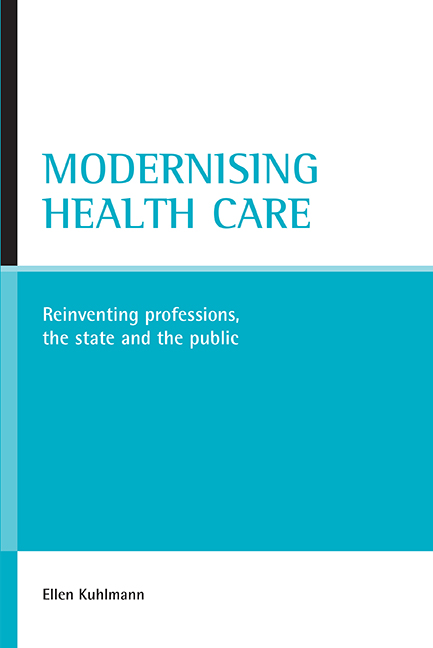Book contents
- Frontmatter
- Contents
- List of tables and figures
- Acknowledgements
- Abbreviations
- Glossary
- Introduction
- one Towards ‘citizen professionals’: contextualising professions and the state
- Part I Mapping change in comparative perspective
- Part II Dynamics of new governance in the German health system
- Part III The rise of a new professionalism in late modernity
- References
- Appendix: Research design of the empirical in-depth study
- Index
- Also available from The Policy Press
seven - New actors enter the stage: the silent voices of consumers in the landscape of biomedicine
Published online by Cambridge University Press: 15 January 2022
- Frontmatter
- Contents
- List of tables and figures
- Acknowledgements
- Abbreviations
- Glossary
- Introduction
- one Towards ‘citizen professionals’: contextualising professions and the state
- Part I Mapping change in comparative perspective
- Part II Dynamics of new governance in the German health system
- Part III The rise of a new professionalism in late modernity
- References
- Appendix: Research design of the empirical in-depth study
- Index
- Also available from The Policy Press
Summary
When ‘citizen consumers’ fall ill, we can test the promises of new governance and citizenship. We can study the tensions between the new demands arising from the inclusion of users – as citizens, consumers and patients – in decision making and the interest-based strategies of the professions, especially medicine. This chapter brings in the patients’ perspectives. Do patients take on the role of expert patient? Does the model actually serve their demands and needs? Does it provoke shifts in the system of care? And how does the medical profession react to claims for user participation? Changes are analysed on meso and micro-levels: the informed consent and shared decision making of patients and doctors, and the new procedures of formalisation and standardisation of care via EBM and clinical guidelines. Results show that the medical profession is capable of transformations that include new demands. A consumerist model of a market-savvy expert patient thus challenges medical power and knowledge without necessarily shifting the balance of power. Data highlight that patients are willing to exercise their new role as experts in some situations, while wishing for help and advice in others. Tensions are thus embedded in the model of a citizen consumer, who is expected to take over self-responsibility for health and exercise control over providers. These new tensions may turn out to challenge the government rather than the medical profession.
Power and partnership: the deceptive promises of consumerism
The move towards consumerism is connected to new promises of partnership between users and providers, especially doctors, and the inclusion of user representatives in the health policy process. Health policy calls for ‘self-responsible’ citizens, and attempts to shift the balance of power towards service users in order to improve the control of providers. However, the promises of participation do not translate easily into changing power relations and more ‘empowering’ conditions of health care. The limitations and obstacles can be identified on different levels: a lack of institutional support and organisational strength of user initiatives; the diversity and ambivalence of patient demands and wishes; and the reflexivity of medical practice that is capable of including and transforming new demands on partnership with patients.
Health policy increasingly includes user representatives as stakeholders on regulatory boards. Recent changes in the public law institutions and the legal framework of health care described in Chapter Three mark an important step towards improved citizenship rights in the area of health care.
- Type
- Chapter
- Information
- Modernising Health CareReinventing Professions, the State and the Public, pp. 155 - 178Publisher: Bristol University PressPrint publication year: 2006



